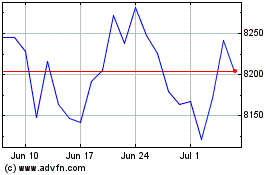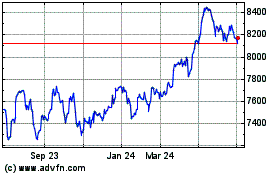By Christopher Whittall
Financial markets showed signs of stabilizing Tuesday following
sharp falls in the British pound and global equities after the U.K.
voted to leave the European Union last week.
Futures markets pointed to a 1% rise for the S&P 500
following two days of losses that saw $3 trillion wiped out from
global stock markets. Changes in futures aren't necessarily
reflected in market moves after the opening bell.
The pound rose 1.1% against the dollar to $1.338, though
remained near a three-decade low reached Monday after a dramatic
selloff following the vote. The Stoxx Europe 600 rose 2.9%, having
tumbled nearly 11% over the previous two trading sessions.
Financial stocks led the gains in Europe after two days of steep
losses.
Investors continued to digest the ramifications of Britain's
unexpected referendum result for the global economy and European
politics as U.K. Prime Minister David Cameron traveled to Brussels
Tuesday to discuss the so-called Brexit with EU leaders.
After two sessions of heady gains, demand for havens eased
Tuesday. Gold fell 0.8% to $1314 an ounce, while the yield on the
10-year Treasury note rose slightly to 1.476%, according to
Tradeweb, as prices fell.
The yen, which also tends to gain during times of market stress,
fell 0.5% against the dollar after steep gains over the past two
days.
Mark Dowding, a senior portfolio manager at BlueBay Asset
Management, said global markets are likely to stabilize following
the recent declines, and that the impact of Brexit won't be felt as
keenly in Europe and the U.S. as in the U.K.
"I'd be inclined to think we have seen most of the worst of it
in the course of the last couple of days in terms of global assets,
but we may not have seen the worst of it in terms of the U.K.," he
said.
Mr. Dowding cautioned against reading too much into Tuesday's
bounce in sterling, though, warning that the pound could fall as
low as $1.20 against the dollar following Thursday's vote.
"You've got an economic crisis, a constitutional crisis, a
political crisis. The outlook for the pound looks depressingly
bleak," he said.
The strongest impact of Brexit is likely to be felt in the U.K.
economy, analysts say. Economists at Goldman Sachs Group Inc. have
lowered their real growth domestic product forecasts for the U.K.
by half a percentage point for 2016 and by 1.8 percentage points
for 2017, implying a mild recession by early next year.
Standard & Poor's Global Ratings stripped the U.K. of its
triple-A credit rating Monday and Fitch Ratings cut the country's
rating by a notch, predicting an "abrupt slowdown" in growth as
businesses postpone investment.
"It's going to be volatile for as long as we haven't got clarity
on what happens next," said Russell Silberston, a fund manager at
Investec Asset Management. "The U.K. doesn't really have a
government. We don't have an opposition. We don't know who's in
charge. The country is split."
The Stoxx Europe 600 banks index gained 3.3% Tuesday after
sinking to its lowest level since 2011 Monday, while the insurance
subindex rose 4.7%. The UK-focused FTSE 250 index climbed 3.1%,
though remains around 9% lower versus a week ago.
The WSJ Dollar Index, which measures the greenback against 16
other currencies, declined 0.4% Tuesday as market stress subsided
after rising 2.7% over the past two trading days. Elsewhere in
currencies, the euro gained 0.5% against the dollar at $1.107.
In commodities, Brent crude prices rose 2.3% to $48.24 a barrel
after two sessions of declines, helped by a weaker U.S. dollar and
a production strike in Norway.
Asian shares mostly ended higher in choppy trade. The Nikkei
Stock Average closed up 0.1% after earlier falling as much as 1.9%
earlier in the session.
Japanese government bond yields hit record lows, meanwhile, with
the yield on the 20-year note nearing negative territory for the
first time.
Expectations of further policy easing from the Bank of Japan
have boosted these securities, which have also benefited from a
flight to safety following the Brexit vote.
Many investors now expect major central banks to act to counter
a potential drag on the global economy after the Brexit vote, with
many predicting rate cuts from the Bank of England and further
stimulus from the European Central Bank.
Fed fund futures, which investors and traders use to bet on
movements in U.S. interest rates, indicated Monday there is a
greater probability of the Federal Reserve cutting interest rates
than raising interest rates before the end of 2016, according to
CME Group, though rates remaining unchanged was shown to be the
most likely outcome.
"The most immediate impact of Brexit will be on economic growth.
That in turn will have a significant effect on central banks'
monetary policy stances," said Tanguy Le Saout, head of European
fixed income at Pioneer Investments.
Write to Christopher Whittall at
christopher.whittall@wsj.com
(END) Dow Jones Newswires
June 28, 2016 08:40 ET (12:40 GMT)
Copyright (c) 2016 Dow Jones & Company, Inc.
FTSE 100
Index Chart
From Mar 2024 to Apr 2024

FTSE 100
Index Chart
From Apr 2023 to Apr 2024
